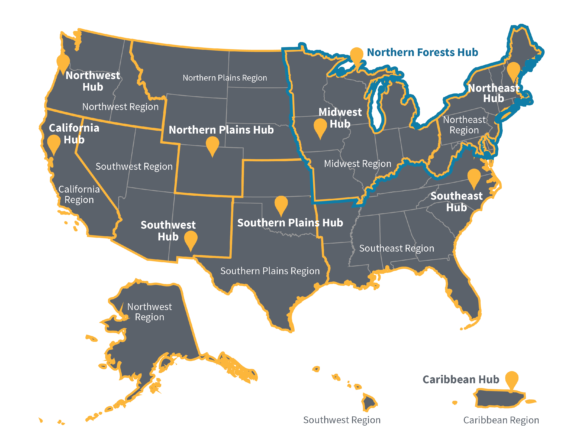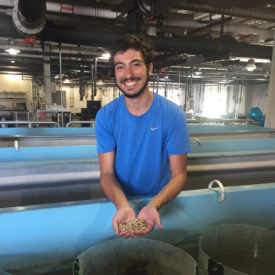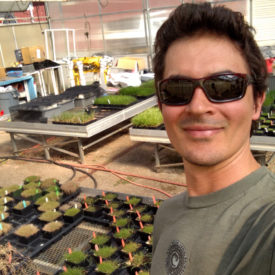
Map of USDA Climate Hubs.
Rutgers graduate students whose research focuses on climate change effects and adaptation in agriculture, forestry and aquaculture, attended a workshop at the Gulf of Maine Research Institute in Portland, Maine on March 19. The workshop capped a yearlong project offered by the U.S. Department of Agriculture Northeast Climate Hub network.
The project, Northeast Graduate Student Climate Adaptation Partners (GradCAP), has involved 15 master’s and doctoral degree students from six USDA Northeast Climate Hub partner institutions from West Virginia to Maine. GradCAP is designed to build a digital library of information and a webinar series based on their research.
The Rutgers graduate students in the 2018 cohort who attended the workshop are Michael Allen, doctoral candidate in the Graduate Program in Ecology and Evolution; Michael Acquafredda, doctoral candidate in the Graduate Program in Ecology and Evolution; and William Errickson, doctoral candidate in the Graduate Program in Plant Biology.

Michael Acquafredda.

Michael Allen.

William Errickson.
The USDA Northeast GradCAP scholars program was developed by Ivan Fernandez, distinguished professor in the School of Forest Resources and Climate Change Institute and the UMaine representative to the USDA Northeast Climate Hub, and Erin Lane, coordinator of the USDA Northeast Climate Hub. Marjorie Kaplan, associate director of the Rutgers Climate Institute, serves as the Rutgers liaison with the Northeast Region Climate Hub administrators and other institutional collaborators.
The project offers a template for future support—training, experiential learning and opportunities to gain field experience—of early career professionals across the spectrum of initiatives led by the USDA and other agencies.
In 2014, the USDA Northeast Climate Hub, a collaboration of USDA agencies, announced partnerships with Rutgers and 15 other land-grant universities in the Northeast to give the region’s farmers, foresters and land managers better access to information and tools for adapting to climate and weather variability.
Based in Durham, New Hampshire, the USDA Northeast Climate Hub is one of seven regional hubs nationwide formed to address increasing climate and weather-related risks to agriculture, broadly defined to include farms, forests and aquaculture. The partnership is focused on creating a network of information sharing designed to provide stakeholders with resources to both mitigate greenhouse gas emissions and adapt to the challenges of a changing climate. The universities are active partners in developing, implementing and evaluating materials that describe how to best cope with increasing weather variability and longer-term trajectories of change in the climate system.

